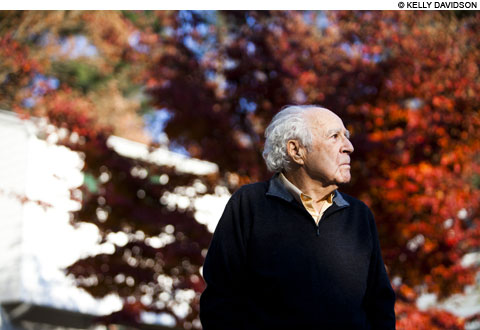
A WRITER’S LIFE UMass professor Joseph Zaitchik began working on his recently published first novel decades ago as a young man. |
Once a year, Joseph Zaitchik tells his favorite joke.He has been telling it for nearly five decades, always on the first day of his "Bible as Literature" class, which he has taught continuously at the University of Massachusetts at Lowell since the Johnson administration. It goes like this:
One day, the Absentminded Professor is smoking his pipe in his 10th-floor office. After years of internal debate he finally he summons the courage to quit smoking. "Damn pipe!" he shouts. "No more!" He leaps to his feet, tears the pipe out of his mouth, rushes to the upper-story window, and throws it outside.
Only, he forgets to let go . . .
Over chuckles and groans, Zaitchik explains the metaphor: fixed certainties, he says, are a lot like the Absentminded Professor's pipe — they can be hard to release when you most need to let them go.
Zaitchik — my grandfather — has never been one to cater to preconceived notions. For example, retirement. When he delivered his Absentminded Professor joke this September, he was 87 years old, among the oldest active professors in the history of the institution.
He's also become a first-time novelist. In November, a small press in Florida publishedThe Fitting — a project he began as a young man, and reworked many times throughout the course of a writer's life in which he produced 1940s pulp fiction, 1950s mystery stories, college humanities textbooks, and a Stanley Drama Award–winning 2004 play, Be Our Joys. ("They told me the competition was for aspiring playwrights, but my hearing is not so good, and I thought they said expiring playwrights," he says.)
The Fitting revolves around an elderly Russian Jewish tailor named Alex Shapiro who becomes drawn into the investigation of a university student's murder. Shapiro — like the author's immigrant rabbi father — likes to quote the Old Testament prophets.
"The main character quotes from the Bible not because he's a Jew," says my grandfather, who emigrated to Boston from Minsk as a boy in 1927, "but because he finds much in the Bible that casts light on human nature, our strengths and weaknesses, virtues and vices, achievements and failures, hopes and despairs."
I recently sat down with my grandfather at his home in Wayland to discuss his Russian-Jewish heritage, his new novel, and what the hell took him so long.
WAS THE PLOT OF THE NOVEL INFORMED BY YOUR DECADES AT LOWELL? IT DEALS HEAVILY WITH "TOWN-GOWN" TENSIONS AND RADICAL STUDENT GROUPS, AMONG OTHER ACADEMIC THEMES. I was chairman of the Student Affairs Committee during the turbulent '60s and '70s. I had to deal with conflicting perspectives and values of administration, faculty, and students. We never experienced the confrontations and violence of some of the larger universities, but we did have some close shaves: the president threatened to shut down the student newspaper, there were angry protests, and after Kent State final exams were cancelled and the college shut down. The committee spent many late and early hours with administrators and student leaders trying to keep the peace. Compared to many other colleges, we were fairly successful.